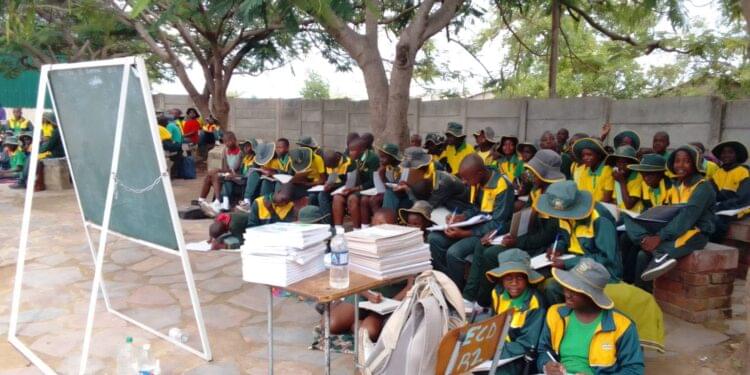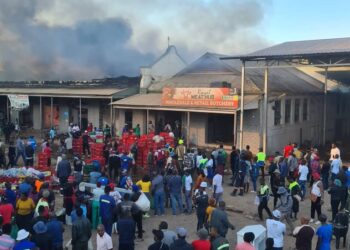PRIMARY and Secondary Education Minister Torerai Moyo and his permanent secretary, Moses Mhike, had a first-hand account of witnessing pupils learning under trees and in open spaces at a Chinhoyi school.
The affected learners include extremely vulnerable early childhood development (ECD) and those soon to sit for their Zimbabwe School Examination Council (ZIMSEC) final tests.
While the trend of squatting under trees and on open plains is synonymous with rural settings, learners at the urban institution are susceptible to the scorching sun that usually precedes heavy downpours that characterise the current rainy season.
The top government officials who also included provincial education director Gabriel Mhumha acknowledged that accommodation woes at Mhanyame Primary School, incepted in 2002, needed to be dealt with expeditiously in order to give learners and teachers decent workstations.
Mhanyame headmaster, Kufakuneyi Rupere, told ministry officials there was an overwhelming demand for places at his school owing to its impeccable track record of producing high pass rates in Grade 7 national examinations.
“We have traditionally produced good results and there is increased demand from parents and guardians who want to enrol their children with us hence the large enrolment against few classroom blocks,” Rupere told delegates during a Thursday tour.
The school which is run by Chinhoyi Municipality has, however, initiated construction of classroom blocks to ease the shortage of teaching and learning space.
Chinhoyi Municipality director of housing and community services, Hilda Kabangure could not be reached to elaborate on infrastructural development plans at the council-administered school.
There is an enrollment of 805 boys and 810 girls at the institution tucked in Gunhill high-density suburb of Chinhoyi.
Parents and guardians were exacerbating cash flow challenges at Mhanyame Primary School by failing to timeously pay fees and levies, it was also heard.
“There is laxity on the part of parents and guardians to pay fees. Some are choosing to neglect payment of school fees and levies on the mistaken belief they have government protection which says no child must be sent away for non-payment of fees,” said Rupere.
“In 2024, even those that used to pay fees and levies religiously have taken a stance not to pay altogether resulting in a slump in fee payments.”
Only 61 percent of pupils had school fees paid for them in 2023 while efforts were underway to recover outstanding balances from the 39 percent whose benefactors defaulted.
The minister reiterated no child should be chased away or victimised over non-payment of fees, but schools must find strategies to force defaulters to own up, including naming and shaming parents or handing them over to debt collectors.
The late disbursement of Basic Education Assistance Module (BEAM) funds to cater for fees for underprivileged learners was also hampering development plans at the school, which in 2013 won the Secretary’s Bell Award for Best Performing School.
The minister also toured Sinoia Primary and Chinhoyi High to assess the level of preparedness as the 2024 school calendar kicked off in the wake of a debilitating Cholera outbreak in the country.
He lamented Zimbabwe was reeling under the effects of a medieval disease that should have been eradicated by now.
However, Moyo said he was impressed by the strict compliance with enunciated Standard Operating Procedures (SOP) that included the provision of clean running water to wash hands to ensure high levels of hygiene to prevent transmission of cholera among teachers, learners and ancillary staff.
The minister was on his third leg of a national tour that has so far taken him to various provinces, including Harare, Mashonaland East, West and Central.
Source NewZimbabwe










